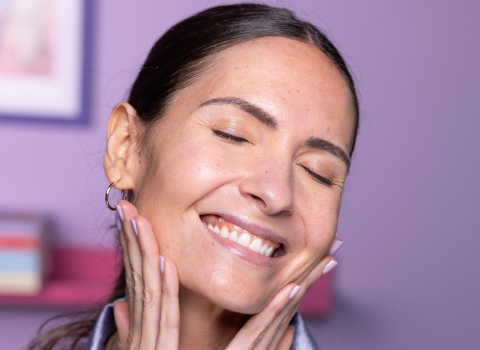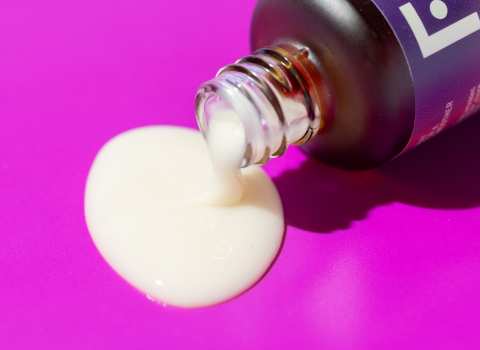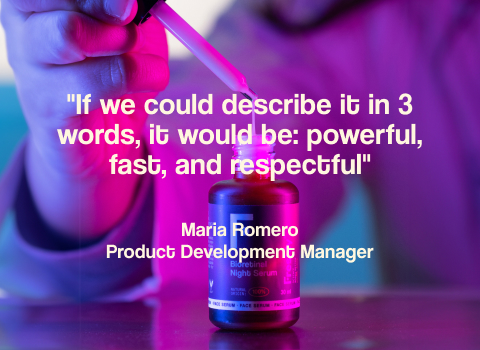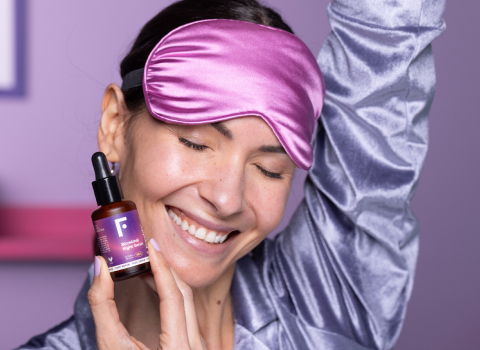Concentrated natural retinal serum - 30ml
Retinal, what is it? Retinol, retinal, retinoids... are they the same? Can someone explain it to me?

Here are your essentials
for making it this far
Have you ever heard of retinol? What about retinal? Is your goal to achieve firm and even skin? Are you looking to reduce wrinkles and acne marks, but can't seem to be able to do so?
If you have any of these questions (or all of them lol), you are in the right place. We will answer all of them, and you will discover the most powerful active ingredient to achieve healthy, smooth, even, firm and renewed skin. No, we haven't gone crazy! Biotechnology has made it possible! It nailed it with a very powerful active ingredient. Can you guess which one? Here’s a little hint: it goes with an A, like Advance... Keep reading and find out.
Let's talk about vitamin A and retinoids, specifically retinol and retinal. Are they the same? Nope, they are not. Let's talk about the difference between them.
First... What are retinoids?
Retinoids are a different form of vitamin A through which this vitamin goes through a synthesis process to work its magic on our skin!
In other words, vitamin A has to undergo a transformation in order to have an effect on our skin. We ingest it through food, and it ends up reaching our skin through the bloodstream, first as retinol, then as retinaldehyde (also known as retinal), and finally, as retinoic acid, the active form of vitamin A.
But before we continue and see the differences between retinol and retinal, you may be wondering... what does vitamin A do to our skin? What are its benefits? Why do we need it?

What does vitamin A contribute to our skin?
As we mentioned, vitamin A works on our skin in the form of retinoic acid and achieves the following:
- It accelerates cell renewal, meaning that it promotes smoother, more even and less wrinkled skin.
- It strengthens the skin barrier, protecting it against water loss and the impact of external agents. It also stimulates the synthesis of involucrin and filaggrin, two essential proteins for the formation and function of the skin barrier.
- It stimulates collagen production, resulting in reduced wrinkles, expression lines, and marks.
Now, let's talk about the differences between retinol and retinal, and their benefits for the skin.
Retinal vs retinol. Similarities and differences between retinol and retinal
As we mentioned earlier, both are retinoids (meaning they belong to the same family) and therefore have common aspects, but also differences. Let’s dive into them!
Similarities between Retinol and Retinal
- They are forms of Vitamin A (retinoids)
- They improve skin texture and tone
- They reduce wrinkles and marks
- They achieve firmer and more even skin
.jpg)
Differences between retinol and retinal
- Strength: retinal is only one step away from becoming retinoic acid (the active form of vitamin A). Therefore, it is 11 times more effective than retinol.
- Tolerance: retinal has better skin tolerance and is more compatible with the skin. It is in fact recommended for all skin types. We could say that it is the retinoid for sensitive skin, even for skin with rosacea.
- Antibacterial action: this characteristic is unique to retinal, which is very interesting for oily or acne-prone skin.
Why do we say all this? In the image here, you’ll find a simple and straight-to-the-point explanation. Think of a race where the goal is firm and even skin, but before reaching the goal, different "tests" must be passed. As you can see, retinal has an advantage over retinol, we could say that it is "better prepared" and is one step ahead of retinol, so it will reach the "goal" faster, don't you think?
We have explained vitamin A and the different retinoids in a simple way and in a few words, but if you'd like to delve deeper into this aspect and get a more scientific explanation, here below you'll find more details:
The Science Behind Retinol - Retinal → Retinoic Acid
Vitamin A in its different molecular forms plays an essential role in the functioning of the organism, specifically for bones, vision, immune system, and skin. The main way of incorporating Vitamin A is through diet, as it ensures an effective and beneficial integration into the tissues and system of the organism.
However, its forms and its role in topical application should be considered to offer the best efficacy and skin tolerance. Topically applied retinoic acid causes skin irritation. A long-term study showed that 44% of volunteers developed erythema, 35% scaling, and 29% burning or itching. Hence, it is a form that is only used under medical prescription. Both Retinol and Retinal have much higher skin tolerance, with Retinal being the one with greater tolerance and lower risk for all skin types. This is because, in comparison, a much lower concentration of Retinal is needed to achieve the same result.
The big reason for prioritising the use of Retinal on the skin is that it does not require NAD+ molecules to metabolise into the active form of retinoic acid, being a closer precursor of the active molecule. Retinol requires two steps to generate the active molecule in the skin, Retinal only one, the oxidation (this step does not consume resources of the organism). This step from Retinol to Retinal in the skin requires an essential molecule called NAD+.
Did you know that NAD+ is an essential molecule for energy metabolism, and that its long-term preservation promotes longevity?
This, on one hand, makes the application of Retinol much less effective than that of Retinal (Up to 10 times less effective), because it generates "extra work" for the skin to synthesise the active molecule and therefore as we age, the conversion from Retinol to Retinal worsens, reducing the effectiveness of retinol with age. At 50 years old, our body has 50% less Nad+ than at 20.
Consuming NAD+ molecules in this process is an unnecessary "expense" for the skin. Retinol is not a dangerous cosmetic ingredient, its application is safe. But when we talk about results and associated risks, it is not the most optimal solution for the skin. Retinal is the most stable form (Retinol degrades faster once the product is opened), has greater skin tolerance (because you do not need such a high concentration to generate the same clinical result) and uses fewer resources of the organism to be used by the skin and thus take advantage of the magnificent skin benefits of this wonderful Vitamin.
At Freshly, we take great care in conducting this study and ensuring that the formulas we create have the highest safety and efficacy. We don't seek to generate fear, nor discredit any product or formula on the market, we only put the interests of those people who believe in us first. Miquel Antolín, co-founder of Freshly

What is retinal. Everything you need to know about retinal
Retinal is the most potent retinoid and, at the same time, the most respectful to the skin barrier, to reduce wrinkles and acne marks, achieving renewed, firm, smooth and even skin. However, retinol was introduced first... why?
Retinal has been part of the history of cosmetics and dermatology for years (in fact, the same amount of time as retinol) but it had a drawback... Its benefits could not be used because it was extremely difficult to stabilize, so it could not be safely formulated in a skincare product.
This has changed TODAY... Biotechnology has made it possible! The science we love.

Y... why not use retinoic acid directly?
This active form of vitamin A, retinoic acid, is still difficult to stabilize and can be aggressive to the skin, which is why it is not marketed within the cosmetic world (at least, for now...)
And bakuchiol? Isn't it an alternative to retinol? And to retinal?
Yes, it is still an alternative to retinoids (forms of vitamin A). However, science, or rather, biotechnology, has advanced a lot in this aspect and it can now provide us with more powerful and skin-friendly alternatives. The main difference is that bakuchiol is not a retinoid, while retinol and retinal are, therefore, the latter two are photosensitive, require a special commitment and have to be used with care, but it's worth it! Below, we provide more details about the differences between bakuchiol and retinal:
Bakuchiol (for day and night use)
-Natural alternative to retinoids
-Not photosensitive
-Provides firmness
-Reduces wrinkles
-Safe for pregnancy and breastfeeding
Retinal (exclusive for night use)
-Retinoid obtained through biotechnology
-Photosensitive
-Provides firmness and even tone
-Reduces wrinkles and acne marks
-Not safe for pregnancy and breastfeeding
You can combine them, including bakuchiol in your morning routine and retinal in your night routine, to enhance the results. It’s a winner combination!
Can I combine retinal with...?
People who use or are familiar with retinol know that it cannot be combined with certain ingredients such as AHA and BHA acids. Also, certain aspects need to be taken into account if your routine includes azelaic acid, niacinamide, or vitamin C.
Therefore, in this case, retinal (being a retinoid) also has certain characteristics and aspects to consider when combining this powerful active ingredient with others in your routine. It requires commitment... but it's worth it!
YES, retinal can be combined with:
- Vitamin C
- Niacinamide
- Azelaic acid
** Apply them in the morning and Retinal at night.
NO, retinal cannot be combined with:
- AHA and BHA acids
** You can use them on alternate days.
We have already answered all the questions we raised at the beginning, regarding retinol, retinal, and retinoids. We hope that this guide has been useful and has helped you to better understand these active ingredients, and which one is the most suitable for your skin. The science we love. But there's more...

Retinal 100% natural. More powerful, effective and more respectful
If you are now clear whether your skin needs retinal, you have to know about this product.
Bioretinal Night Serum is not just a retinal serum (with a concentration of 0.16% retinal), it is also 100% natural, obtained through biotechnology, and its formula is enriched with various types of vegan hyaluronic acids, of high and low molecular weight. To act on the epidermis and also reach the deeper layers of the skin. A perfect match to achieve a more nourished, firm and even skin, with fewer wrinkles and acne marks. Just what you were looking for, right?
Freshly wants to tell you something! At Freshly we keep on learning every day how to make decisions that bring us closer to a better future. Sometimes we are called dreamers, but what we really have is an optimistic vision and clear path for reaching that tomorrow.
Would you like to join this adventure? If you're here, it's because you are a demanding person when it comes to taking care of your body and the planet. By subscribing to the newsletteryou will receive articles like this one to continue learning, as well as news and exclusive discounts. Are you up for it?



